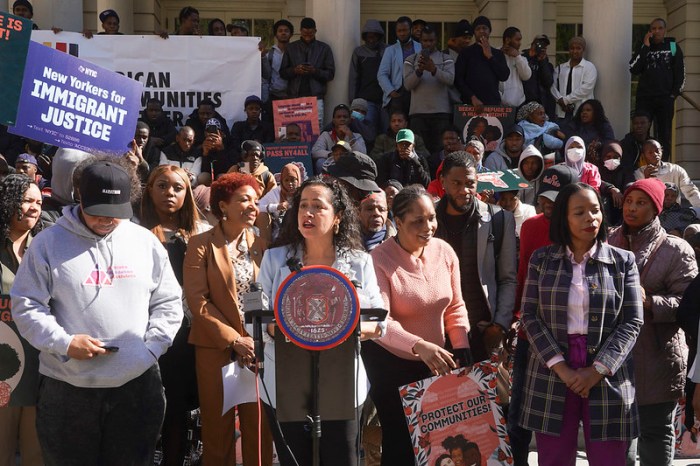The Indian Supreme Court building in New Delhi. | LEGALEAGLE86/ COURTESY WIKIMEDIA COMMONS
BY ARTHUR S. LEONARD | In an historic decision, a two-judge bench of the Supreme Court of India, ruling on a petition brought on behalf of transgender community members by the National Legal Services Authority, has declared that among the human rights protected by the nation’s Constitution are the right to state recognition of their gender identity and sexual orientation and to freedom from official discrimination on these grounds.
The April 15 ruling directly contradicted the December 11 ruling by a different panel of the court rejecting a constitutional challenge to the country’s sodomy law, and the court is now signaling the possibility of reconsidering the sodomy decision.
The National Legal Services Authority and several other plaintiffs jointed in a lawsuit against the government, seeking to redress the outcast status of transgender people in India, but the court’s expansive language appeared to take in — at least to some extent — the social inequities endured by gay, lesbian, and bisexual people as well.
High court ruling comes amidst hints draconian 2013 sodomy decision may be revisited
The court mentioned in passing the recent sodomy decision, Koushal v. Naz Foundation, but said it was expressing no opinion on that issue “since we are in these cases concerned with an altogether different issue pertaining to the constitutional and other legal rights of the transgender community and their gender identity and sexual orientation.”
Even before this decision was issued, a different panel of the court had evinced a willingness to examine a “curative petition” filed by the Indian government in the Naz Foundation case, so it is possible that a new opinion may be forthcoming on the sodomy question. If a new ruling were consistent with the decision in the transgender rights case, it would be a reversal of the other panel’s retrogressive December opinion, which overturned a 2009 Delhi High Court ruling that struck down the sodomy law.
Each of the judges on the transgender rights panel case — Justices K. S. Radhakrishnan and A.K. Sikri — wrote an extended opinion, with Radhakrishnan’s far longer opinion setting forth historical background and a thorough review of the treatment of transgender and gender identity issues in the statutes and court rulings of other English-speaking nations.
“Discrimination faced by this group in our society is rather unimaginable and their rights have to be protected, irrespective of chromosomal sex, genitals, assigned birth sex, or implied gender role,” Radhakrishnan wrote. “Rights of transgenders, pure and simple, like Hijras, eunuchs, etc., have also to be examined, so also their right to remain as a third gender as well as their physical and psychological integrity.”
Interestingly, the court came to this conclusion — that some individuals are entitled to be recognized under the law as other than male or female, or “third sex” — shortly after Australia’s highest court came to the same conclusion and allowed an individual who identified as neither male nor female to have an official gender identity of “not specified” in official documents. That ruling apparently came too late to be included in the opinion out of India, but the panel cited a lower court ruling from New South Wales in 2013, which was endorsed by Australian high court.
The Indian panel took particular note of legislation adopted in the UK, Australia, and elsewhere that created formal mechanisms for individuals who do not identify with the gender they are assigned at birth to change their status. The court also quoted at length from Australian legislation adopted last year regarding discrimination based on sexual orientation, gender identity, and intersex status. Since no legislative action has taken place in India, the panel noted with regret, it is left to the courts to ensure transgender individuals of full legal and social equality
Radhakrishnan’s opinion is particularly fascinating in reviewing the history of gender-variant people in India, where it seems they had a rather exalted status prior to the British colonial period. The UK introduced the sex-negative baggage of its 19th century imperial jurisprudence, leaving behind the unfortunate legacy of Section 377, which outlawed oral and anal sex and has lingered in many former British colonies. Recent efforts to amend the Singapore Penal Code’s sodomy prohibition, for example, have proved unsuccessful.
Even while finding that international norms of gender equality were appropriate to considering the case, the two-judge panel court also found that several Indian constitutional provisions were relevant to consider.
“Article 14 of the Constitution of India states the State shall not deny to ‘any person’ equality before the law or the equal protection of the laws within the territory of India,” wrote Radhakrishnan. “Article 14 does not restrict the word ‘person’ and its application only to male or female. Hijras /Transgender persons who are neither male/ female fall within the expression ‘person’ and, hence, [are] entitled to legal protection of laws in all spheres of State activity, including employment, healthcare, education as well as equal civil and citizenship rights, as enjoyed by any other citizen of this country.”
Failing to recognize their identity, the judge continued, “denies them equal protection of law, thereby leaving them extremely vulnerable to harassment, violence, and sexual assault in public spaces, at home, and in jail, also by the police.”
The court concluded, “Discrimination on the ground of sexual orientation or gender identity, therefore, impairs equality before law and equal protection of law.”
The court also found that discrimination against transgender Indians violated Articles 15 and 16 of the Constitution, which bar discrimination based on “sex.” Here, the court applied the notion of sex stereotyping as sex discrimination, first applied in the US in 1989, in a Supreme Court challenge to Price Waterhouse’s failure to promote a women to a partnership because she was insufficiently feminine. Two years ago, in response to a transgender woman’s employment discrimination complaint against the federal Bureau of Alcohol, Tobacco, Firearms, and Explosives, the US Equal Employment Opportunity Commission embraced the view that discrimination based on gender identity is sex discrimination, outlawed by the 1964 Civil Rights Act.
The panel found that “values of privacy, self-identity, autonomy, and personal integrity are fundamental rights guaranteed to members of the Transgender community under… the Constitution of India and State is bound to protect and recognize those rights.”
The court also drew on an Indian constitutional provision analogous to the US Due Process Clause — which protects the dignity of the individual and was critical in Edie Windsor’s victory last year in her challenge to the federal Defense of Marriage Act — to find additional protections for transgender rights.
Radhakrishnan focused, in particular, on “third gender” individuals who do not identify as male or female, asserting the government must respect their gender identity and adopt policies and official forms to acknowledge their existence. Gender-neutral terms in the Indian Constitution such as person and citizen, he found “take within their sweep Hijras/ Transgenders and are not as such limited to male or female gender. Gender identity as already indicated forms the core of one’s personal self, based on self-identification, not on surgical or medical procedure. Gender identity, in our view, is an integral part of sex and no citizen can be discriminated on the ground of gender identity, including those who identify as third gender.”
Focusing on the development of human rights principles around the globe , Justice Sikri observed, “There is thus a universal recognition that human rights are rights that ‘belong’ to every person, and do not depend on the specifics of the individual or the relationships between the right-holder and the right-grantor… If democracy is based on the recognition of the individuality and dignity of man, as a fortiori we have to recognize the right of a human being to choose his sex/ gender identity which is integral to his/ her personality and is one of the most basic aspects of self-determination, dignity, and freedom.”
The two judges agreed that the government must protect transgender and third gender individuals from discrimination and take affirmative steps to improve their conditions and opportunities. Among other things, they directed the government to “provide them separate public toilets and other facilities” — an approach that would likely not find favor among transgender rights advocates in the US. Noting that the Indian government had already established a study commission on the transgender community, the panel stated its recommendations should “be examined based on the legal declaration made in this Judgment and implemented within six months.”


































